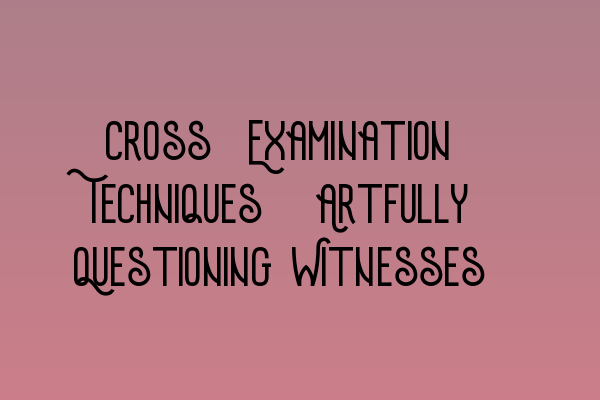Cross-Examination Techniques: Artfully Questioning Witnesses
Welcome to SQE Criminal Law & Practice Law UK! In today’s blog post, we will discuss the art of cross-examination and the various techniques that can be employed to skillfully question witnesses in court.
Understanding Cross-Examination
Cross-examination is a crucial aspect of any criminal trial. It provides an opportunity for the defense to challenge the credibility, accuracy, and reliability of the witnesses presented by the prosecution. Effective cross-examination can sway the jury’s perception of a witness and ultimately impact the outcome of the case.
At SQE Criminal Law & Practice Law UK, we believe that mastering cross-examination techniques is essential for aspiring criminal lawyers. Here, we will delve into some key strategies that can help you artfully question witnesses and uncover critical information that may strengthen your client’s defense.
1. Control the Narrative
One of the primary goals of cross-examination is to control the narrative and steer the witness’s testimony in a favorable direction. By asking open-ended questions, you can prompt the witness to provide detailed answers that support your client’s case. For example, instead of asking “Did you see the defendant at the crime scene?”, consider asking “Describe what you observed when you arrived at the crime scene.”
2. Use Leading Questions
Leading questions can be a powerful tool during cross-examination. By phrasing questions in a way that suggests the desired answer, you can subtly influence the witness’s responses. This technique is particularly useful when dealing with hostile or evasive witnesses. For example, instead of asking “Did you see the defendant holding the weapon?”, ask “Isn’t it true that you saw the defendant holding the weapon?”
3. Challenge Inconsistencies
Another effective technique is to challenge inconsistencies in the witness’s testimony. By comparing statements made during different stages of the case, you can expose contradictions and cast doubt on the witness’s reliability. This approach often requires meticulous preparation and a thorough understanding of the facts. Remember to remain confident and observant during cross-examination to seize every opportunity to point out discrepancies.
Further Resources
If you’re interested in exploring more SQE-related topics, we highly recommend checking out the following articles:
- SQE 1 Practice Exam Questions
- SQE 1 Practice Mocks FLK1 FLK2
- SQE 2 Preparation Courses
- SQE 1 Preparation Courses
- SRA SQE Exam Dates
These resources will provide you with additional study materials, practice exams, and important information about upcoming SRA SQE exams.
Conclusion
Mastering the art of cross-examination is crucial for any criminal lawyer. By employing techniques such as controlling the narrative, using leading questions, and challenging inconsistencies, you can effectively question witnesses and strengthen your defense. Don’t forget to check out the related articles mentioned above for further SQE preparation resources.
Thank you for reading! Stay tuned for more informative posts from SQE Criminal Law & Practice Law UK.
